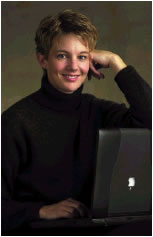
| Vol. 12. No. 4 |
Spring 2003 |

 When
this issue of Continuum—which we optimistically refer to
as the “spring” issue—began to take shape, we realized
that, quite by accident, it was populated with a number of searchers and
seekers.
When
this issue of Continuum—which we optimistically refer to
as the “spring” issue—began to take shape, we realized
that, quite by accident, it was populated with a number of searchers and
seekers.
The most obvious is alumnus Todd Gabler BS’89, a private investigator
who specializes in missing persons. Then there’s Jim Ehleringer,
a biologist—and Distinguished Professor—who analyzes isotopes
for clues about the origin of counterfeit money, bacteriological weapons,
even suspected terrorists. Add to that the doctors and scientists at the
U who, bolstered by a new NIH grant, continue to search for more information
about the causes of addiction—which will hopefully lead to better
treatments and, ultimately, prevention. Plus, we found a couple of dedicated
puzzle solvers at the Utah Museum of Natural History, who put together
pieces of the past to give visitors and scientists a first look at ancient
pottery.
One of our Continuum writers, Randy Hanskat, even set out on a deliberate search—to find true-red Utah fans. He followed the trail from one fan to the next and, long after the article’s deadline, was still digging up examples of Ute fan-aticism.
Of course, such searchers and seekers can feel at home at a research
university like the University of Utah, which is dedicated to imagining
possibilities and probing new pathways. This idea, obvious as it may be,
was nonetheless made clear to me in researching our cover story on tenure.
Professors, committed to a lifetime of scholarship, are therefore committed
to asking significant questions, always pushing the envelope in their
field. As Katharine Coles PhD’90, associate professor of English
and current president of the Academic Senate, said during our conversation,
“The great thinkers are also the ones who have come up with lots
of ideas, many of which fail. They have earned the right to fail, to have
a multitude of ideas.”
Given the non-linear process that is part of creative thought, evaluating
that process through quantitative means can be a tricky business. Whether
it’s limiting the time in which a student is allowed to finish a
degree, or measuring the value of a degree by the salary it generates,
or speaking of “accountability” in terms of the hours a professor
spends in the classroom, higher education is often assigned numbers—figures
that may have no relationship to what’s actually being learned or
discovered. Responsibility is unquestionably part of discovery. But measurements
alone may not reveal the value of a search. Sometimes it’s the search
itself that is of real value, and sometimes it’s the unexpected
results, achieved through dogged research and an open mind.
Speaking to the Alumni Association board last fall, Mario Capecchi, Distinguished
Professor of human genetics and investigator at the Howard Hughes Medical
Institute, said he came to the University of Utah from Harvard in 1973
because the U offered him the luxury of time. He needed to immerse himself
in the idea of gene targeting—involving years of research—
without the pressure of being asked for daily results. Patience has paid
off. Among his many honors, Capecchi is today the recipient of the 2001
Albert Lasker Award for Basic Medical Research (“America’s
Nobel Prize”) and one of 15 recipients of the National Medal of
Science in 2002 for his technique of knocking out genes. As he said in
a Continuum article a few years ago, “You can ask trivial
questions and you’ll get answers, but they’ll be trivial answers.”
In a similar vein, in December we learned of the death of Charles Dibble
BA’36, a Distinguished Professor of anthropology at the U. He was
the subject of a warmly received Continuum article in Fall 2000,
and a man who epitomized the notion of patiently putting together a puzzle.
Dibble and colleague Arthur J. O. Anderson worked together to translate
the 12 volumes of The Florentine Codex, a project that was supposed
to take five years. Instead, it took 30. (Said Dibble, “Fools rush
in where angels fear to tread.”) The Florentine Codex is
now a cornerstone of Mesoamerican studies, making available valuable knowledge
of Aztec civilization for generations of scholars and readers. It’s
a tribute to Dibble’s patient and thorough scholarship and, hopefully,
a reminder of the importance of searching.